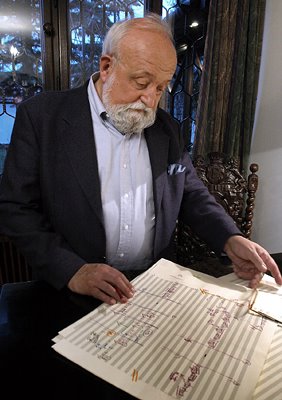Seven Gates of Jerusalem
| Available at Amazon: Penderecki, Symphony No. 7: Seven Gates of Jerusalem, Warsaw National Philharmonic Choir and Orchestra, Antoni Wit(released on October 31, 2006) |
 As Dr. Ronit Seter explained in a paper ("BBC's 1997 Broadcast of Penderecki's Seven Gates of Jerusalem: A Case of Recomposition?") given at the Capital Chapter meeting of the American Musicological Society in 2004, the BBC broadcast version of the piece's premiere was a significant recontextualization of the work. The producer of the program, Antony Pitts, interspersed sections of Seven Gates with mini-documentary segments on the history of Jerusalem. Dr. Seter contends the following: "Despite the composer's seeming cultural openness in interviews I conducted with him in Jerusalem, Seven Gates of Jerusalem is Penderecki's rendering of a decidedly Christian -- not Jewish, not Muslim -- Jerusalem, just as the city was traditionally stereotyped (and orientalized) in Western church music."
As Dr. Ronit Seter explained in a paper ("BBC's 1997 Broadcast of Penderecki's Seven Gates of Jerusalem: A Case of Recomposition?") given at the Capital Chapter meeting of the American Musicological Society in 2004, the BBC broadcast version of the piece's premiere was a significant recontextualization of the work. The producer of the program, Antony Pitts, interspersed sections of Seven Gates with mini-documentary segments on the history of Jerusalem. Dr. Seter contends the following: "Despite the composer's seeming cultural openness in interviews I conducted with him in Jerusalem, Seven Gates of Jerusalem is Penderecki's rendering of a decidedly Christian -- not Jewish, not Muslim -- Jerusalem, just as the city was traditionally stereotyped (and orientalized) in Western church music."Certainly, as a Pole, Penderecki relies naturally on a Catholic background, and the words his chorus and soloists sing are the Latin Vulgate translations of the Psalms and books of the Prophets. Only in the sixth movement, Facta es super me manus Domini, does the language of Latin give way to Hebrew (Ezekiel 37), in a part for speaker. Even so, the music that seems to be referenced quite often, if not actually quoted, in the rather plain melodic lines is the psalm tones of Gregorian chant. The first movement is a slow, solemn invocation of the foundation of Jerusalem: "Great is the Lord, and exceedingly to be praised in the city of our God, in his holy mountain" (texts from Psalm 48 (47) and Psalm 96 (95)). In the second movement, one of the soprano soloists (Aga Mikołaj) leads a memorial to Jerusalem, kept in sacred memory even during the captivity in Babylon: "If I forget thee, O Jerusalem, let my right hand be forgotten. Let my tongue cleave to my jaws, if I do not remember thee: If I make not Jerusalem the beginning of my joy" (from Super flumina Babylonis, Psalm 137 (136)).
| Other Recording: Warsaw Philharmonic: Live (2000) |
This performance, made in Warsaw Philharmonic Hall in 2003, is good, if not outstanding. Any time you have a large chorus like this, intonation is going to be sketchy, and there are some sonorities, especially open fifths, that never quite lock into place. However, at around $10, this disc costs less than half its only other competition, a 2000 recording by the Warsaw Philharmonic.
Naxos 8.557766





















































No comments:
Post a Comment